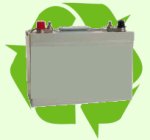As of the beginning of this year, manufacturers of all kinds of batteries sold in the European Union will have to pay for the collection, treatment and recycling of batteries, including rechargeables and deep cycle batteries used in renewable energy applications.
Furthermore, the new regulations affect any business that uses, supplies, or disposes of batteries, as well as any business that manufactures or designs battery-powered products.
From 1 February this year, retailers selling 32kg or more of household batteries annually will also have to take back the batteries in-store, free of charge, when they become waste.
While 90% of automotive batteries in the UK are already recycled thanks to previous legislation, household battery recycling is less than 3%.
The goal of the new directive is to ensure that batteries no longer wind up in landfill and to maximise recycling potential. Many batteries contain valuable components such as lead, cadmium and zinc – that are also environmental toxins.
According to an article on BusinessGreen, 190,000 tonnes of industrial batteries, 800,000 tonnes of automotive batteries enter the EU market each year. 160,000 tonnes of household batteries are disposed of annually in the EU.
Currently in Australia, with the exception of Western Australia, there are no restrictions on the disposal of used household batteries, with 94 per cent ending up in landfill. Over 360 million household batteries, amounting to in excess of 9000 tonnes, go to landfill each year.












































